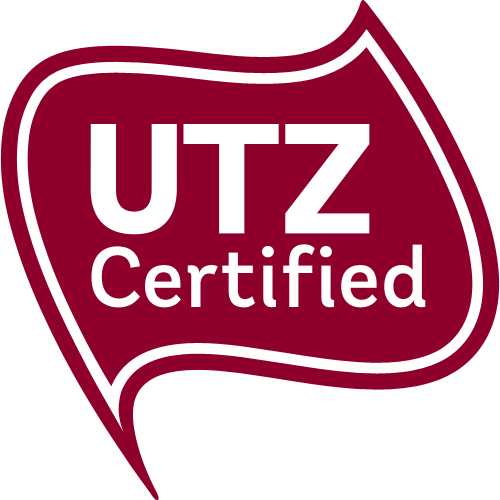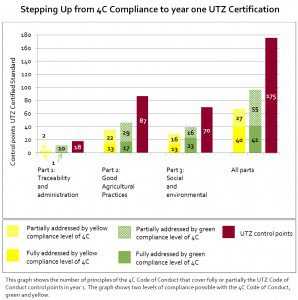AMSTERDAM, The Netherlands – The Colombian Coffee Growers Federation (FNC), the Sustainable Coffee Program (SCP) powered by IDH (The Sustainable Trade Initiative), Tchibo GmbH, the 4C Association and UTZ Certified announced today the findings of the pilot project Stepping-up from 4C compliance to UTZ certification.
The pilot confirmed that the 4C entry level sustainability standard helps farmers to take the first crucial steps on their journey, providing a strong foundation for them to move to higher levels of sustainability practices such as the ones required to achieve UTZ certification.
The pilot project was conducted amongst 92 coffee farmers in Colombia over the last year.
How the code of conducts of the 4C Association and UTZ relate
The 4C code of conduct is made up of 10 unacceptable practices and 28 principles. It is based on a continuous improvement approach that works with a traffic light system of red practices to be discontinued, yellow to be improved, and green, which indicates that the highest level of compliance with the 4C code has been achieved.
Farmers need to achieve at least an average yellow level to pass 4C verification. The UTZ code of conduct is made up of 175 control points that need to be met to achieve UTZ certification. There is a four year continuous improvement cycle in which the number of mandatory control points increases from year 1 to year 4.
The project showed that the more general 4C principles often encompass several UTZ control points, which are more specific in their requirements.
The graph below depicts the quantitative results of the desktop comparison between the two standards.
Regarding qualitative results, the study pointed out key areas in which the 4C verified farmers are well prepared to step up to UTZ certification. These areas include efficient use of pesticides, fundamental rights and a basic traceability system. The qualitative results of the comparison explaining the practical steps for farmers to achieve UTZ certification were developed within the framework of the project and reflected in a comprehensive guide for farmers – The Stepping Up Implementation Guide.
“This is a ground-breaking project given its potential to effectively reduce efforts, investments and other costs of compliance for coffee farmers in their journey towards sustainable coffee production,’’ stated Melanie Rutten-Sülz, executive director at 4C Association.
“We believe that only by working together with other standards in a stepwise approach and avoiding as much as possible duplication of efforts can we build a more sustainable coffee world for generations to come,” she concluded.
“The findings of this study, as well as the creation of the stepping up guide, mark an important milestone in the collaboration between the 4C Association and UTZ Certified. This will benefit farmers who want to take the next step in sustainability, thereby creating an even better future for themselves, their workers and their families,” said Han De Groot, executive director at UTZ Certified. This project also highlights the importance, from the perspective of public and private funding partners, of initiating such stepping up projects as this as it allows Standard organisations to familiarize and complement each other’s efforts and scope as well as inspire further collaboration.
Consequently, the increased access coffee farmers have to standard systems will lead to an improvement of practices and increased efficiencies all along the value chain.
The study Stepping up from 4C compliance to UTZ certification is a joint initiative between the Colombian Coffee Growers Federation, German coffee roaster Tchibo, The Sustainable Trade Initiative (IDH), 4C Association and UTZ Certified.
For more information download the Stepping-up Implementation Guide by clicking here.




















